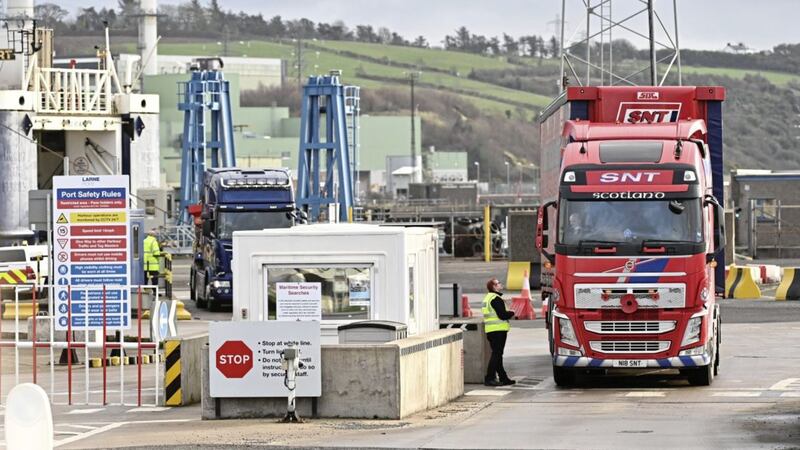The most important aspect of the latest protocol confrontation is that behind the outrage everyone is saying roughly the same thing - or pointing to the same sea border landing zone, to mix a transport metaphor.
This is the red and green channel model, where goods from Britain that will stay in Northern Ireland pass through a green channel and are not checked, while goods heading onward to the Republic or the rest of the EU pass through a red channel and are checked.
It is a concept more than a description: there might not be two physical lanes at the ports and a sample of green goods would still need to be checked. However, a simple concept of picturing adaptations to the protocol is what politics requires and the unanimity on this one is striking.
The terminology of red and green channels is used by the UK government, the UUP and Alliance, the latter even including it in its assembly election manifesto: “we believe that a green channel style system can be put in place to separate goods that are staying in Northern Ireland from those that may proceed into the EU single market.”
The same idea is implied by the Irish government. Foreign affairs minister Simon Coveney said this week: “the EU can move to remove a significant amount of checks on goods that we can show are staying in Northern Ireland”.
That reflects the official line from Brussels, endorsed by Sinn Féin and the SDLP.
The EU prefers the protocol terminology of risk rather than channels but the practical meaning is the same.
Notably, it has begun using the term “express lane” to describe reduced checks for goods staying in Northern Ireland.
There is also broad agreement on how the different channels would operate.
The UK government says its “proposals to fix the protocol” are “green and red channel arrangements, backed up by a bespoke data-sharing system”.
Coveney refers to “comprehensive labelling and real-time sharing of data”.
The UUP manifesto proposed “labelling products that are only bound for Northern Ireland and not onto the EU single market as being for ‘UK sale only’.”
The channel model meets the DUP’s seven tests on the protocol, all of which have been carefully worded so that the green channel can be portrayed as removing the sea border within the UK.
Crucially, a two-channel approach is evolving by default because so much of the protocol is unworkable as agreed. Nobody now says the protocol is without flaws, let alone insists it should be rigorously implemented.
The EU had initially indicated it would take a flexible view on goods at risk of entering the single market, before declaring its legal order required everything to be considered at risk. Yet it has since put medicines in the green channel, recognising it would be politically impossible to do otherwise. It has also accepted the UK indefinitely extending grace periods on chilled meat, a move once considered impossible but increasingly viewed as permanent.
Acknowledging the consensus on the landing zone is difficult when nobody trusts the UK, relationships are fraught and there are a bewildering range of power-plays at work. However, it is not difficult to see the consensus - it is almost absurdly obvious.
All five main Stormont parties clearly enjoyed their grandstanding during Boris Johnson’s visit on Monday. While their criticisms of the prime minister may have been valid, that does not absolve them of responsibility to take positive action.
It is no use complaining about the DUP’s veto over power sharing unless you call for reform of that veto, which nationalism is still reluctant to do. It does not matter that the protocol is a non-devolved issue. Under the system we have, either of the two largest parties can block formation of an executive for any reason.
Getting out of this deadlock begins with acknowledging points of commonality.
In 2016, Arlene Foster and Martin McGuinness - or their officials, anyway - produced a joint statement on Brexit.
In 2020, the ‘rigorous implementation’ statement was issued by Sinn Féin, the SDLP, Alliance and the Greens.
A joint statement today on the red and green channel approach, whether or not it used that exact language, could make a significant contribution to resetting the protocol debate. Ideally, all five parties could sign it, although any number would be useful if they encompassed green and orange. It might stick in everyone’s craw to seek common ground with the DUP. But that is the system we have as well.









